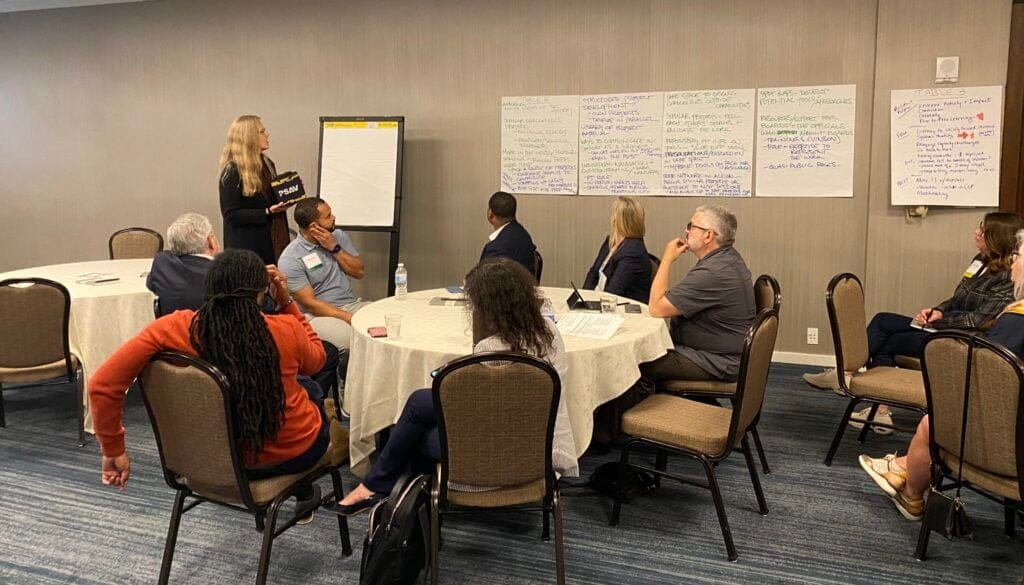
ACI seeks to increase the availability of capital in the right places, at the right times, and for the right purposes. The initiative comprises field research, a national community of practice, and technical assistance and support for participants to develop and deploy impactful mission-aligned investment opportunities. These opportunities create a more fertile environment for investment in community and economic development, housing, and more, benefiting residents and communities. ACI also works with public finance agencies, community capital conduits, and impact-aligned investors to further develop the community investment ecosystem.
About ACI
Through research and a community of practice, ACI explores the intersection of public finance, capital providers, impact investors, and community—enabling those actors to more deeply influence the profound multilevel systems change needed to achieve greater opportunity for people in place by:
- Strengthening the connection of impact investors to public economic development, housing finance, and/or community development finance
- Optimizing impact investing portfolios for various asset holder types
- Boosting positive impact of capital on people in place across the national community investment ecosystem

Inviting Investors to Put Their Money Where Their Mission Is
An event that felt like an altruistic episode of Shark Tank played out in Boston at the Accelerating Community Investment initiative’s latest investor challenge. ACI now includes more than 100 member organizations in 18 states, as well as a network of more than 50 investors.
Read the article
How local leaders and communities are leading the transition to clean energy
In this episode of Metro Blueprint, a podcast by the Brookings Institution, Robert “R.J.” McGrail, director of ACI, joins Xavier de Souza Briggs, senior fellow at Brookings Metro, and Melanie Allen, founding co-director of the Hive Fund, to discuss how federal policy affects our energy future and what it will take to bring affordable and resilient energy to everyone.
Listen to the podcast
Building an American Energy Future for All
Learn how community-scale clean energy projects can drive economic growth, create jobs, cut carbon emissions, and provide energy savings while empowering communities to build a cleaner, more reliable energy future.
Watch this panel discussion on the origins and goals of ACI featuring Lincoln Institute CEO and President George W. “Mac” McCarthy, Lincoln Institute Senior Fellow and ACI Director Robert J. “R.J.” McGrail, and former FB Heron Foundation President Dana Bezerra.
Our Work

National Community of Practice
We connect participants in local community investment ecosystems to each other and to their peers elsewhere through a community of practice that includes 100 agencies and institutions from 18 states. The group meets both virtually and in person to build partnerships, identify new investment opportunities, and share experiences and advice. Learn about the latest convening.

Training, Coaching, and Technical Assistance
ACI has provided significant virtual and in-person coaching, education, and learning beyond the community of practice, exposing participants to new knowledge and tools that increase their effectiveness and impact.

Local Investor Challenges
ACI hosts local investor challenges to spotlight community investment opportunities and enable participants to develop and share new, community-driven opportunities to impact investors and catalytic capital holders. Four initial sessions—held in Atlanta, Cincinnati, New Orleans, and Austin—have allowed participants to pitch investment-ready projects to local investors and receive direct feedback from potential investors.
Community of Practice
At the heart of this is a national community of practice of community and institutional leaders, who will build partnerships, receive training and technical assistance, and identify new investment opportunities. Current participants are listed below.

Alabama
Arizona
Office of the Governor Katie Hobbs
Arizona Office of Economic Opportunity
California
California Housing Finance Agency (CalHFA)
California Affordable Housing Agency (CALAHA)
California Infrastructure and Economic Development Bank (IBank)
Golden State Finance Authority (GSFA)
Rural County Representatives of California (RCRC)
Georgia
Georgia Department of Community Affairs (DCA)
Georgia Social Impact Collaborative (GSIC)
Community Foundation for Greater Atlanta
Federal Reserve Bank of Atlanta
Morehouse College/International Comparative Labor Studies Program
Hawaii
Hawaii Housing Finance & Development Corporation
Hawaii Alliance for Community-Based Economic Development
Massachusetts
Massachusetts Community Climate Bank
Governor’s Office of Climate Innovation & Resilience
Michigan
Michigan State Housing Development Authority
Michigan Economic Development Corporation
New Hampshire
New Mexico
New Mexico Finance Authority (NMFA)
New Mexico Economic Development Department (EDD)
New Mexico Mortgage Finance Authority (MFA)
Santa Fe Community Housing Trust
Tennessee
Chattanooga Area Chamber of Commerce
Community Foundation of Greater Chattanooga
Memphis Medical District Collaborative
City of Memphis & Shelby County Community Redevelopment Agency
Texas
Texas State Affordable Housing Corporation (TSAHC)
Austin Economic Development Corporation (AEDC)
Federal Reserve Bank of Dallas
Texas Association of Community Development Corporations (TACDC)

